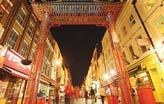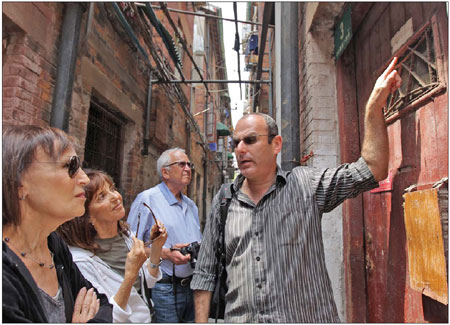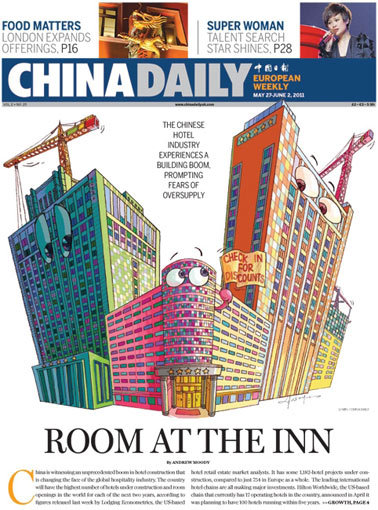Tomb Raider
Updated: 2011-05-20 11:01
By Matt Hodges (China Daily European Weekly)
Israeli tour guide leaves no gravestone unturned in bid to save Shanghai’s Jewish history
|
|
In a dank apartment in Shanghai's most famous ghetto, which 70 years ago housed at least 20,000 Jewish refugees, a huddle of tourists, mostly Jewish-American retirees, are watching a TV screening of an excavator hauling a gravestone out of a mudflat.
One of the guests, 79-year-old Bill Feldman, is struggling to stay awake in the baking summer heat. He nods off, jolts awake, and then wonders aloud if a man he met in Los Angeles, a Jewish boxer who spent two years walking from Eastern Europe to Shanghai, ever walked through this community.
Back on TV, several trucks are shuttling a collection of tombstones from one storage depot to another.
Meanwhile, the documentary maker, Dvir Bar-Gal, who also happens to be the tour guide, asks onscreen if the displaced burial stones will ever find a permanent home.
For him, the story of Shanghai offering refuge from Nazi persecution when most countries looked the other way is not yet finished. Local media came up with a nickname for him years ago: Tomb Raider.
This trip down memory lane, private or collective, motivates many Jewish travelers (and non-Jewish ex-pats) to sign up for Bar-Gal's five-hour guided tours of the city, once dubbed "The Port of Last Resort".
The Israeli reporter-cum-historian starts his tours at the opulent Bund riverside, specifically the Peace Hotel, an art-deco masterpiece built by Sephardic Jew Victor Sassoon in 1920.
He then moves on to Huoshan Road, or "Little Vienna", past China's first British-made prison and through the one-square-mile ghetto in Hongkou district that housed the Jewish refugees - China puts the official count at 30,000 - during World War II. About 70 percent arrived between 1939 and 1941.
"We go from the very haves to the very have-nots," says Bar-Gal.
Lining the river's west bank are relics of Shanghai's golden period in the 1920s and 1930s, when it served as the financial capital of the Far East.
Several of the buildings, as well as much of the property on Nanjing West Road, Shanghai's Park Avenue, was once owned by Jewish entrepreneurs, we are told. Bar-Gal breaks the Jewish migration into Shanghai into three digestible chunks: the Baghdadi Jews, the Russian Jews, and those who fled Hitler's concentration camps.
Many of the visitors are aware of the last group, which includes W Michael Blumenthal, the former US treasury secretary, and Eric Halpern, cofounder of the Far Eastern Economic Review. Other Jewish luminaries include Eli Kadoorie, the poor clerk who built the legendary Peninsula Hong Kong, and Silas Hardoon, the Sassoons' rent collector who went on to become "the real-estate king of Shanghai".
They are less familiar with early 20th-century figures, such as adventurer Morris Cohen, who served as aide-de-camp to Sun Yat-sen, founder of the Republic of China.
As the group heads northeast in white minivans, some are surprised to find that the ghetto has not changed much in the past seven decades: it is still cramped, dirty and increasingly out of place with Shanghai's glitz.
Bar-Gal says by war's end, all but 3,000 of the Jews had left, mostly for the United States or Australia.
As of 1976, only 10 Jews remained in the city, according to local media. Bar-Gal says the expat community has since picked up, from 300 in 2001, when he arrived, to 3,000.
As for the ghetto where the Japanese controllers of the city shunted the Jews in May 1943 at the request of their German allies, much of it seems stuck in a time warp.
E-paper

Tapping into the future
Foreign companies are investing in China's water industry as many predict a growing profit margin.
Headhunters ride on growth
Commercial property rides wave
Learning from the past
Specials

Cuisine central
London's Chinatown is helping diners appreciate full palate of Chinese food

Tying the knot
Danish couple's high-end macrame export business takes off in the mountains of Yunnan.

Truly a super woman
Li Yuchun first came to prominence in 2005 as the Super Girl winner, and since then has become an international star.

